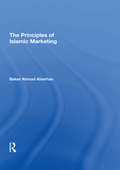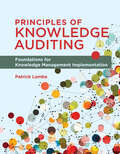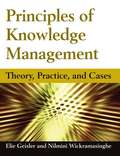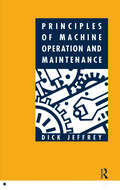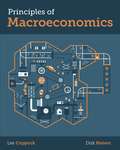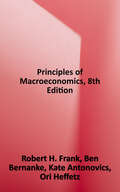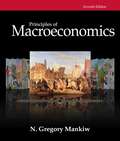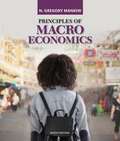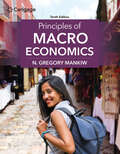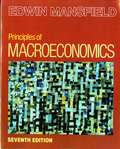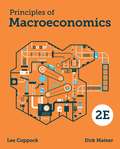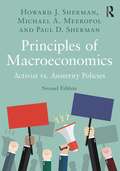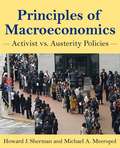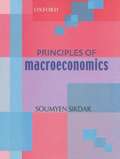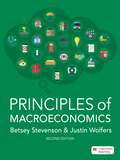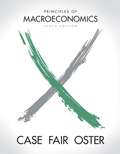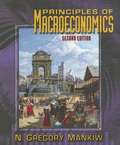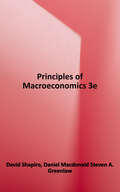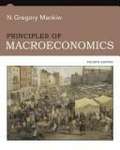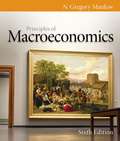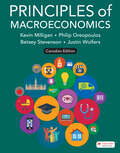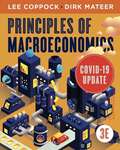- Table View
- List View
The Principles of Islamic Marketing
by Baker Ahmad AlserhanThe Principles of Islamic Marketing fills a gap in international business literature covering the aspects and values of Islamic business thought. It provides a framework and practical perspectives for understanding and implementing the Islamic marketing code of conduct. It is not a religious book. The Islamic Economic System is a business model adopted by nearly one fifth of the world's population. Baker Alserhan identifies the features of the Islamic structure of International Marketing practices and ethics. Adherence to such ethical practices elevates the standards of behaviour of traders and consumers alike and creates a value-loaded framework for firms, establishing harmony and meaningful cooperation between international marketers and their Muslim target markets. His book provides a complete guide to the requirements an organization needs to follow when managing its entire marketing function within the Muslim market or when adapting part of its offering to that market. It addresses the challenges facing marketers involved in business activities with and within Islamic communities, the knowledge needs of academic institutions, and the interest of multinationals keen on tapping the huge Islamic markets. Along the way, Baker Alserhan provides insights into the various aspects of promoting to the Islamic markets such as franchising, distribution channels, and retailing practices, branding, positioning, and pricing issues; all within the Muslim legal and cultural norms. Above all, The Principles of Islamic Marketing will lay the foundation of, and advance, Islamic Marketing as a new social science.
Principles of Knowledge Auditing: Foundations for Knowledge Management Implementation
by Patrick LambeA comprehensive theoretical and practical guide to the operating principles of knowledge auditing, illustrated with numerous case studies.A knowledge audit provides an &“at a glance&” view of an organization's needs and opportunities. Its purpose is to improve an organization's effectiveness through a better understanding of the dynamics and levers of knowledge production, access, and use. However, this developing field is hampered by the lack of a common language about the origins and nature of knowledge auditing. In Principles of Knowledge Auditing, Patrick Lambe integrates the theory and practices of the field, laying out principles and guidelines for a clearer and more pragmatic approach to knowledge auditing that makes it more accessible to practitioners and researchers.Lambe examines knowledge auditing in the context of the development of communications, information, and knowledge management in the twentieth century. He critiques and clarifies ambiguities in how knowledge audits are approached and described, as well as how the results are conveyed within organizations. He discusses the benefits and risks of knowledge management standards. Knowledge auditors, he says, need a common frame of reference more than they need standards. Standards have their uses, but they provide only markers and sign posts and are poor representations of the richness of the landscape. He concludes with a set of guiding principles for practitioners.
Principles of Knowledge Management: Theory, Practice, and Cases
by Eliezer Geisler Nilmini WickramasingheThis text provides a comprehensive introduction to the new field of knowledge management. It approaches the subject from a management rather than a highly technical point of view, and provides students with a state-of-the-art survey of KM and its implementation in diverse organizations. The text covers the nature of knowledge (tacit and explicit), the origins and units of organizational knowledge, and the evolution of knowledge management in contemporary society. It explores the implementation and utilization of knowledge management systems, and how to measure their impact, outputs, and benefits. The book includes a variety of original case studies that illustrate specific situations in which the absence or existence of knowledge management systems has been crucial to the organization's actions. Charts and figures throughout help clarify more complex phenomena and classifications, and each chapter includes review questions and a comprehensive index.
Principles of Machine Operation and Maintenance
by Dick JeffreyThis book explains how rotating machinery works, and the role of the maintenance engineer in ensuring its proper operation. Stress is laid on the need for the trainee engineer to develop skills in diagnosis and troubleshooting as well as practicalexpertise in maintenance procedures.
Principles Of Macroeconomics
by Lee Coppock Dirk MateerAn innovative instructor uses his tested insights and successful teaching practices to create a truly student-centered approach: real-world examples, pedagogy developed in his own classrooms, and problem solving tools that resonate with today's students.
Principles of Macroeconomics
by Robert H. Frank Ben Bernanke Kate Antonovics Ori HeffetzPrinciples of Macroeconomics focuses on seven core principles to produce economic naturalists through active learning. By eliminating overwhelming detail and focusing on core principles, students from all backgrounds are able to gain a deeper understanding of economics. Focused on helping students become "economic naturalists," people who employ basic economic principles to understand and explain what they observe in the world around them. COVID-19 pandemic content, analysis, and examples further engage students. <p><p> With engaging questions, explanations, exercises and videos, the authors help students relate economic principles to a host of everyday experiences such as going to the ATM or purchasing airline tickets. Throughout this process, the authors encourage students to become "economic naturalists." Author developed Learning Glass concept overview videos and Worked Problem videos give students an overview of challenging and important concepts. <p><p> With new videos and engagement tools in Connect, like Application-Based Activities, alongside SmartBook's adaptive reading experience, the 8th edition enables instructors to spend class time engaging, facilitating, and answering questions instead of lecturing on the basics.
Principles Of Macroeconomics
by Robert H. Frank Ben S. Bernanke Kate Antonovics Ori HeffetzPrinciples of Macroeconomics, 7th Edition, provides a deeper understanding of economics by eliminating overwhelming detail and focusing on seven core principles that are reinforced and illustrated through the text. <P><P> With engaging questions, explanations and exercises, the authors help students relate economic principles to a host of everyday experiences such as going to the ATM or purchasing airline tickets. Throughout this process, the authors encourage students to become "economic naturalists:" people who employ basic economic principles to understand and explain what they observe in the world around them. <P><P> With new videos and interactive graphs alongside SmartBook's adaptive reading experience, the 7th edition enables instructors to spend class time engaging, facilitating, and answering questions instead of lecturing on the basics.
Principles of Macroeconomics
by N. Gregory MankiwWith its clear and engaging writing style, PRINCIPLES OF MACROECONOMICS, Seventh Edition, continues to be one of the most popular books on economics available today. Mankiw emphasizes material that you are likely to find interesting about the economy (particularly if you are studying economics for the first time), including real-life scenarios, useful facts, and the many ways economic concepts play a role in the decisions you make every day.
Principles of Macroeconomics
by N. Gregory MankiwEconomics is fundamentally about understanding the world in which we live. Most chapters of this book include Case Studies illustrating how the principles of economics can be applied. In addition, In the News boxes offer excerpts from newspapers, magazines, and online news sources showing how economic ideas shed light on current issues facing society. After students finish their first course in economics, they should think about news stories from a new perspective and with greater insight.
Principles of Macroeconomics
by N. Gregory MankiwGain a strong foundation in macroeconomics with today's most popular economics text, trusted by students worldwide -- Mankiw's PRINCIPLES OF MACROECONOMICS, 10E. Using a clear, inviting writing style, this edition focuses exclusively on content to help you better understand the world and economy in which you live. You become a more astute participant in today's economic environment as you learn the potential and limits of economic policy. The latest examples and learning features bring macroeconomic principles to life as author Gregory Mankiw puts himself in the position of someone seeing economics for the first time. Dr. Mankiw's goal is to emphasize the material you will find most relevant and interesting as you study macroeconomics. MindTap digital resources, Aplia digital homework solution and author videos are also available to help you further master key macroeconomic principles.
Principles of Macroeconomics
by Edwin MansfieldStudents will appreciate the accompanying Study Guide, prepared by Professor Mansfield himself. It contains Chapter Profiles, behavioral Objectives, Case Studies, Objective Questions, Discussion Questions, and Problems for each chapter in the textbook. A separate Computerized Study Guide with approximately 200 review questions and diagrams is also available.
Principles of Macroeconomics: Second Edition
by Dirk Mateer Lee CoppockWritten by professors of microeconomics and macroeconomics at the University of Arizona and the University of Virginia. These professors have brought their innovative teaching experiences to this blockbuster text. They put economics into context by making it relateble through carefully crafted real-world examples, a problem-solving pedagogy that emphasizes economic decision-making, and a voice that speaks directly to students.
Principles of Macroeconomics
by OpenStaxPrinciples of Macroeconomics covers the scope and sequence for a one-semester economics course. The text also includes many current examples, including: the housing bubble and housing crisis, Zimbabwe’s hyperinflation, global unemployment, and the appointment of the United States’ first female Federal Reserve chair, Janet Yellen. The pedagogical choices, chapter arrangements, and learning objective fulfillment were developed and vetted with feedback from educators dedicated to the project. The outcome is a balanced approach to economics, to both Keynesian and classical views, and to the theory and application of economics concepts. Current events are treated in a politically-balanced way, as well.
Principles of Macroeconomics: Activist vs. Austerity Policies
by Howard J. Sherman Michael A. Meeropol Paul D. ShermanIn the years since 2007 the U.S. economy has endured a severe financial crisis, a Great Recession, and continuing heavy unemployment. These events have led to increasing discontent among many people contributing to a substantial vote for Bernie Sanders and the election of Donald Trump. Meanwhile, Europe has witnessed the rise of nationalist parties and Brexit. In the face of these problems and events, economics must change. Principles of Macroeconomics: Activist vs. Austerity Policies provides an antidote to the standard macro texts offering multiple points of view instead of one standard line, a fact-based focus on the causes and cures of instability in economics, and an examination of inequality in the United States. Readers are introduced to both the Classical view, which takes the conservative approach and argues for an austerity program to reduce the size of the government; and the Progressive view, which argues for government intervention to create a strong recovery. These ideas are applied to all the key macroeconomic topics including economic growth, business cycles, and monetary policy. Using the methodology of Wesley Mitchell and drawing on the work of Keynes, the authors also explore topics such as unemployment, the human cost of economic crashes, increasing inequality of income, and the history of capitalism. This second edition includes new material on the Obama recovery, the crisis in the Eurozone, the rise of populism, and the current state of healthcare, education, and environmental issues in America to bring the text fully up to date. It will be of great interest to undergraduate students and particularly those studying the economics of the United States.
Principles of Macroeconomics: Activist vs Austerity Policies
by Howard Sherman Michael A MeeropolPrinciples of Macroeconomics by Howard J. Sherman and Michael A. Meeropol differs from other texts in that this book stresses far more the inherent instability of the macro-economy. The details of the business cycle come early and are integrated throughout the core of usual macro topics (C, I, G, X). The book puts inflation into its proper perspective by recognising that unemployment is the much greater threat to the economic well being of the vast majority of the people. Instead unemployment and its human toll are given far greater emphasis than other texts. The Keynesian model is fully developed; so is the statistical analysis of Wesley Mitchell. The neoclassical model is covered in both its historical evolution and in its implications for current policy debates. Finally, there is strong coverage of the Euro-zone crisis and its linkages to the United States.
Principles of Macroeconomics
by Soumyen SikdarThis textbook introduces macroeconomics to students of economics and management who have limited exposure to the subject. It is a lucid and concise exposition of basic economic theory aided by numerical examples and simple diagrams.
Principles of Macroeconomics
by Betsey Stevenson Justin WolfersStevenson/Wolfers is built around the idea that ‘every decision is an economic decision’. It is the perfect choice for Principles of Economics courses and for economics majors and nonmajors alike.
Principles of Macroeconomics (10th Edition)
by Karl E. Case Ray C. Fair Sharon M. OsterThis textbook contains five parts dealing with Introduction to Economics, Concepts and Problems in Macroeconomics, The Core of Macroeconomic Theory, Further Macroeconomics Issues, and The World Economy.
Principles of Macroeconomics (2nd Edition)
by N. Gregory MankiwIn writing this textbook, Mankiw has tried to put himself in the position of someone seeing economics for the first time. The author's conversational writing style is superb for presenting the politics and science of economic theories to tomorrow's decision-makers. Because Mankiw wrote it for the students, the book stands out among all other principle texts by intriguing students to apply an economic way of thinking in their daily lives. Receiving such praise as "perhaps the best ever" textbook in economic principles, it's no wonder Mankiw's prize project has quickly become one of the most successful books ever to be published in the college marketplace.
Principles of Macroeconomics, 3e
by David Shapiro Daniel Macdonald Steven A. GreenlawPrinciples of Macroeconomics 3e covers the scope and sequence of most one-semester introductory macroeconomics courses. The third edition takes a balanced approach to the theory and application of macroeconomic concepts. The text uses conversational language and ample illustrations to explore economic theories and provides a wide array of examples using both fictional and real-world scenarios. The third edition has been carefully and thoroughly updated to reflect current data and understanding, as well as to provide a deeper background on diverse contributors and their impacts on economic thought and analysis. For example, the third edition highlights the research and views of a broader group of economists. Brief references and deeply explored socio-political examples have also been updated to showcase the critical – and sometimes unnoticed – ties between economic developments and topics relevant to students.
Principles of Macroeconomics (4th edition)
by N. Gregory MankiwIn the fourth edition of this book, more is devoted to applications and less to formal economic theory. Most chapters include case studies illustrating how the principles of economics are applied. "In The News" boxes offer excerpts from newspaper articles showing how economic ideas shed light on current issues facing society.
Principles of Macroeconomics 6th Edition
by N. Gregory MankiwPRINCIPLES OF MACROECONOMICS, Sixth Edition, became a best seller after its introduction and continues to be the most popular and widely used text in the economics classroom. Instructors found it the perfect complement to their teaching. A text by a superb writer and economist that stressed the most important concepts without overwhelming students with an excess of detail was a formula that was quickly imitated, but has yet to be matched. The sixth edition features a strong revision of content in all twenty-three chapters. Dozens of new applications emphasize the real-world relevance of economics for today's students through interesting news articles, realistic case studies, and engaging problems.
Principles of Macroeconomics, Aplia Edition (6th Edition)
by N. Gregory MankiwThis book "Principles of Macroeconomics, Aplia Edition" contains nine parts covering topics on: The Real Economy in the Long Run, Money and Prices in the Long Run, The Macroeconomics of Open Economies, Short Run Economic Fluctuations, and Final Thoughts.
Principles of Macroeconomics Canadian Edition
by Kevin Milligan Philip Oreopoulos Betsey Stevenson Justin WolfersPrinciples is built around the idea that “every decision is an economic decision.” It is the perfect choice for Canadian principles of economics courses and for economics majors and nonmajors alike.
Principles of Macroeconomics: COVID-19 Update
by Dirk Mateer Lee CoppockStudents and instructors are living through a pandemic that has changed how and what they teach, and how and where they learn. The COVID-19 Update of Principles of Economics, Third Edition, provides the information that students need to make sense of the impacts COVID-19 has had on the economy. The Update Edition has been completely revised to include new examples, new data, new policies, and more. All of Norton’s digital resources fully integrate with most learning management systems, providing the flexibility instructors need in this changed world.
